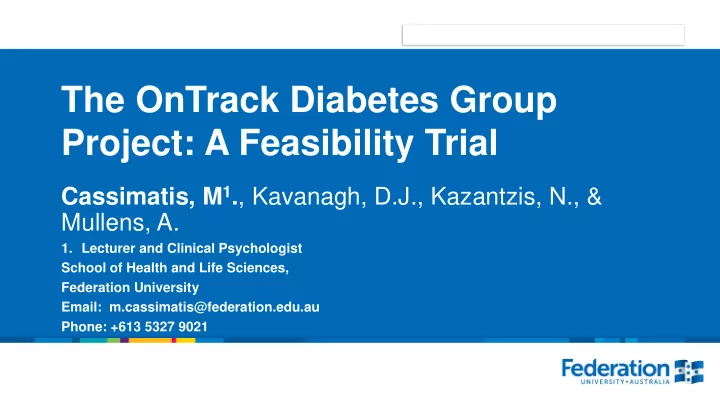

Faculty, school or centre title here The OnTrack Diabetes Group Project: A Feasibility Trial Cassimatis, M 1 . , Kavanagh, D.J., Kazantzis, N., & Mullens, A. 1. Lecturer and Clinical Psychologist School of Health and Life Sciences, Federation University Email: m.cassimatis@federation.edu.au Phone: +613 5327 9021
Type 2 Diabetes • In Australia, 273 new diagnoses of diabetes/ day are diagnosed – Type 2 = 85% • Increasing prevalence, including at younger ages. • Comorbidity with depression and anxiety is high. • Health systems are under-resourced. • Australians living in regional, rural and remote areas are underserved.
Treatment Regime 1. Diet + Exercise 2. + Antidiabetic agents (tablets) 3. + Insulin secretagogues (tablets) 4. + Insulin injections ... + Blood glucose self-monitoring 95% of management is up to the patient.
Mental health & Diabetes In people with diabetes, depression and anxiety symptoms are associated with : • Physical inactivity • Poor nutrition • Reduced diabetes self-care • Poor Glycaemic control • Complications • Mortality
OnTrack Diabetes • Web-based program developed in 2013 • User-centred • Built on feedback from doctors as well as PWD • Based on Social Cognitive Theory • MI and CBT strategies
OnTrack Diabetes Site: https://www.ontrack.org.au/diabetes/login
Journey Map
Interactive Tools
Summary Cards
Emotional Support
Self-Monitoring
Feedback Graphs
OnTrack Diabetes Pilot ( N = 38) and main ( N = 120) RCT 8 across Australia • High user acceptability, perceived utility and user friendliness Trends in reducing consumption of sweet foods and depressive symptoms. Poor user engagement….! • Increasing recognition of the need for more psychological support for PWD who have comorbid mental health conditions, including at the subclinical level.
Group Therapy • Individual CBT has demonstrated efficacy for treating depressive symptoms and self-management separately in PWD. • Results are mixed in terms of efficacy in improving both mood and self-management. • Peer support has shown to be effective in improving diabetes self-management.
OnTrack Diabetes Group Project OnTrack Diabetes + Group therapy (web-based support) (face-to-face)
OnTrack Group Project Location, location, location… Monash Psychology Clinic FedUni Community Services Clinic USQ Psychology Clinic
Aims (1)To evaluate user uptake, engagement, perceived utility and acceptability; implementation fidelity, group cohesion and group-facilitator alliance ; and (2)To evaluate trends in clinical, behavioural, psychological and psychosocial outcomes.
Program Structure 10 x 1.5-hour group therapy sessions covering: • Goal-setting for personalised areas • Physical activity/ behavioural activation • Introduction to Mindfulness • Emotional Balance – Psychoeducation about CBT, diabetes and mood; cognitive restructuring… • Stigma – self-perceived and public stigma • Illness beliefs & representations, identity • Relationship with food • Sleep Homework = completing related activities in OnTrack Diabetes between group therapy sessions.
Method Study sample . 60 adults (2 groups x 10/ group for each site) with type 2 diabetes and at least subclinical depression, anxiety and/ or diabetes-specific distress. Selection criteria: (i ) age ≥18 years, (ii) diagnosis of type 2 diabetes, (iii) DASS21 score of ≥10 for depression and ≥7 for anxiety, (iv) no suicidal ideation, (v) willingness and availability to attend weekly group sessions for 10 weeks, (vi) access to a computer with internet.
Method Study design : Pre- and post-intervention measures - Baseline & 11 weeks Post-Baseline Primary outcomes : User perceived acceptability and utility, implementation feasibility, group cohesion, group-facilitator alliance, program engagement Secondary outcomes : Depressive symptoms, anxiety, diabetes- specific distress, glycosylated haemoglobin A1C (HbA1c level), anthropometric assessments, outcome expectancy & self-efficacy Measures : Undertaken at Baseline and 11 weeks Post-Baseline.
Measures Process Evaluation Group cohesion Gross Cohesion Scale Self-report survey Fortnightly from Week 1 administered in group to Week 10 Post- session Baseline Group-Facilitator Alliance Working Alliance Inventory Quality of Program Implementation Implementation Fidelity Ratings of therapist Independent observer Each session compliance with intervention protocol Program Engagement Engagement in out-of- Exposure to OnTrack Web-based exposure data Analysis by week group tasks Diabetes web program Engagement in within- Rating of workbook Observer rating based on Analysis by session group tasks completion, quality of response content Engagement in group Rating of participation in group Facilitator rated Each session discussion session Homework Rating Scale – II Adherence to homework Administered before group Each session session
Clinical/ Anthropometric Glycaemic control Glycosylated haemoglobin Pathology blood sample Baseline & 11 weeks (HbA1c) level within past 3 months. Post-Baseline Results obtained from client’s GP with their consent. Weight Kilograms Tanita scales at assessment session Waist & hip Centimetres Measured according to circumference WHO-MONICA guidelines at assessment session Behavioural Physical Activity Active Australia Survey; Self-report survey Baseline & 11 weeks Participation Summary of Diabetes Self- administered in Post-Baseline Diet Care Activities Scale assessment session Foot Care Medication Adherence Medication Adherence Rating Scale (MARS) Sleep Insomnia Severity Index Baseline & 11 weeks with Medication Question Post-Baseline Psychological Depression BDI-II, SCID-5 Self-report survey & Baseline & 11 weeks Anxiety BAI, SCID-5 clinical interview Post-Baseline administered in assessment session Diabetes-specific Diabetes Distress Self-report survey distress Screening Scale administered in assessment session
Measures • Qualitative interviews to obtain participant feedback on: • Experience in the group therapy program • Self-perceived impacts of the group therapy and web-based program components • Suggestions for improvements to the group therapy program and web-based program.
Hypotheses (1) Participants will demonstrate high user uptake, engagement , and rate the program as having high perceived utility and acceptability . (2) The program will have high implementation fidelity , (3) There will be a high level of group cohesion and group- facilitator alliance. (1) Trends towards improvements in clinical, behavioural and psychosocial outcomes.
Future Directions • Complete web-based intervention! • Group therapy implemented online • RCT comparing face-to-face and online group therapy (+ web-based program).
Thank you! THE END Dr Mandy Cassimatis School of Health & Life Sciences, Federation University Email: m.cassimatis@federation.edu.au
Recommend
More recommend